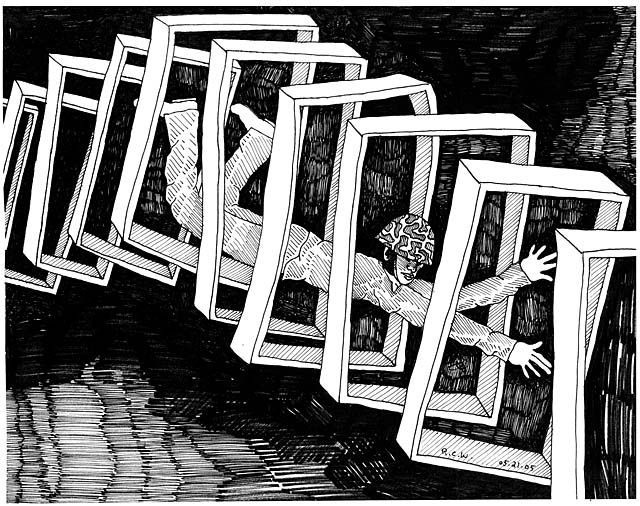 |
|||||||||
|
January/February 2014 PTSD, Recovery, & Resources
BY THOMAS C. HALL, Ph.D. Honor, Courage, Commitment. These are just a few of the core values to which all of us were exposed in the military. These values also reflect the reasons many joined: to follow family tradition, to serve our country and our way of life, to protect people in need, to be a proud member of a team. We all knew, of course, from the time we enlisted or were conscripted that service in the armed forces was something bigger than we were. During our service we experienced the cognitive, emotional, operational, spiritual, and social challenges of deployment, whether stateside or overseas. These challenges varied; they came with the territory; everything was black or white. We were resilient. Most of us came back, quickly overcame alienation, and adapted to the complex civilian choices we faced, as well as to the tempo of life back in The World. We made peace with our new life with its many shades of grey. Sexual assault by a trusted member of the team or a superior undermines—or may destroy—the core values we live by. Coping with the usual levels of alienation, along with adapting to civilian choices and the tempo of life back home suddenly becomes more complex. A wrench has been thrown into our resiliency machine. Who can be trusted? How does a person forgive after being devalued so personally? How does a person rebuild core values, pride in oneself and in the team, and take pride in service to our country? People can recover from the experiences of trauma, including military sexual trauma. Tom Berger of VVA’s Veterans Health Council has reviewed the VA’s policy and procedures. He reports that you do not need a VA service-connected disability rating to be eligible for free MST-related treatment through the VA. Nor is any documentation required to receive MST-related treatment at the VA, even if you are not eligible for other VA care. In fact, all veterans seen at the VA are supposed to be asked whether they have experienced MST. However, veterans seeking disability compensation for MST will be asked to follow the procedure used in PTSD disability claims. Every VA medical center has an MST coordinator who serves as the contact person for MST-related issues. Some VA facilities have special outpatient mental health services for sexual trauma. If a veteran does not feel comfortable in either a mixed-gender or same-sex treatment program, the veteran can ask the MST coordinator to facilitate a change. Vet Centers also have specially trained sexual trauma counselors. The VA has several special residential and in-patient sexual trauma treatment programs around the country for veterans who need more intense treatment and support. These residential and in-patient programs have separate sleeping quarters for women and men. The statutory definition of MST used by the VA is found in U.S. Code 1720D of Title 38. It is defined as “psychological trauma, which in the judgment of a VA mental health professional, resulted from a physical assault of a sexual nature, battery of a sexual nature, or sexual harassment which occurred while the veteran was serving on active duty or active duty for training.” Sexual harassment is further defined as “repeated, unsolicited verbal or physical contact of a sexual nature which is threatening in character.” In more concrete terms, MST includes any sexual activity in which you are involved against your will. You may have been pressured into sexual activities. For example, you may have been threatened with physical harm or even death for refusing to go along. It may have been implied that you would get faster promotions or better treatment in exchange for sex. Or you may not have been able to consent to sexual activities—for instance, if you were intoxicated—or you may have been physically forced into sexual situations. Other MST experiences include unwanted sexual touching or grabbing, threatening or offensive remarks about your body or sexual activities, and threatening and unwelcome sexual advances. If these experiences occurred while you were on active duty or active duty for training, they are considered to be MST by the VA. We adapt to survive. Stress, depression, and other mental health issues associated with surviving rape, sexual assault, and sexual harassment make it more likely that survivors will experience high rates of substance abuse and have difficulty finding work after being discharged from the military. Rape, sexual assault, and sexual harassment are strongly associated with a wide range of mental health conditions for men as well as women. Recent research by the Service Women’s Action Network indicates that MST is the leading cause of post-traumatic stress disorder among women veterans. It has been said—and we believe this is true—that it takes courage to reach out for help. The VA can be an effective place to seek out the kind of evidenced-based intervention and treatment needed to start the process of building a life no longer controlled by the shadow of sexual assault. We adapt to survive. By reaching out for help, we start to live again, and we begin to thrive.
|
|||||||||
|
|
|||||||||
8719 Colesville Road, Suite 100, Silver Spring. MD 20910 | www.vva.org | contact us |
|||||||||









